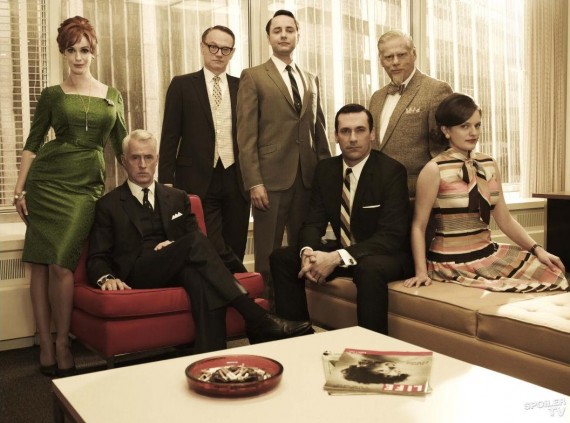Critics Find Real Depiction of 1966 Fake
Sometimes, art imitates life rather than the reverse. And sometimes reality seems stranger than fiction.
Sometimes, art imitates life rather than the reverse. And sometimes reality seems stranger than fiction.
NYT City Room (“On ‘Mad Men,’ an Opening Scene Straight From Page 1“):
The opening scenes of the Season 5 premiere of “Mad Men,” set in 1966, depicted a sort of knucklehead-racism at work, when young men from the advertising agency Young & Rubicam dropped bags filled with water on protesters picketing on the Madison Avenue sidewalk below. Wet and angry, several protesters came upstairs to demand to know who at the firm had dropped the water bombs.
One protester said in disgust, “And they call us savages.”
Some critics found the scene, broadcast on Sunday, a bit too on-the-nose. “It’s a terrible line that should have been red-penciled,” wrote Matt Zoller Seitz for New York magazine. Mike Hale of The New York Times called it“unfortunately ham-handed.”
But no writer is to blame.
Everything in the scene really happened, written almost verbatim from an article on Page 1 of The Times on May 28, 1966.
[…]
The critics, informed that the scene that seemed to them to be wooden was in fact born of flesh and blood, stood their ground.
Mr. Hale: “There is no connection between the fact that it actually happened and the scene was taken from a New York Times article and whether the scene was any good or not.” Of the “savages” quote, he said, “When she said that, it just rings so false.”
Mr. Seitz: “It’s good to know that all that actually happened, but it’s still a terrible line in context of the scene, because it’s an editorial summing-up that tells us all how to feel.”
Hale’s critique is odd, indeed. Whether it “rings false” or not, it’s actually true! (Or, perhaps, the creative work of a 1966 NYT reporter? Such has happened from time to time.) But Seitz’ critique strikes me as valid: Just because something is accurate doesn’t mean makes for effective drama. Indeed, reality is often not the recipe for great storytelling.
I found the scene largely annoying, because it took up too much time, didn’t involve the shows recurring characters, and was used to spin off some rather lame plot developments back at the ad agency that’s the focus of the show. But it’s possible that Weiner is setting up that backstory and plans to do something more interesting with it as the season moves forward.







The agency finally being forced to hire black people is lame. Right. I get that people are praising Mad Men for not including minority characters just as token in past sesons, but now I’m wondering if there is something more sinister to those praises. Better Mad Men stays lily-white instead of being tainted, right?
@Young&Cole:
If they want the show to be a realistic depiction of the world as it was in 1966 that requires not pretending things were different than they actually were
Well, if there’s truthiness, I guess there must be falsiness too.
And it often is. Into Thin Air or the movies Schindler’s List and Lawrence of Arabia being good examples. I haven’t seen this scene from Mad Men but from what I remember about embarking on a business career in the mid sixties it sounds all too real to me. People actually did drink two martinis at lunch and christmas office parties were a lot of fun.
@Brummagem Joe: Oh, reality is a good starting point for drama. But storytelling often creates composites, embellishes, and otherwise strays from literal truth to increase impact.
The dress Peggy has on in that photo is just pitch-perfect. I have some photos of my Mom from her ‘office girl’ days, and it could easily be her or one of her coworkers in that dress.
@James Joyner:
Indeed it does but that isn’t quite what you said. I could also point to a stack of books in addition to Into Thin Air that are entirely factual in content and tell a gripping story about subjects as diverse as experiencing illness or the last days of Hitler.
“I could also point to a stack of books in addition to Into Thin Air that are entirely factual in content”
Unless those books are literally a minute by minute account of every single thing that happens to and around every single character, editorial judgment was used to determine what would actually make it into the book. Even just taking out all the boring parts where nothing seems to happen affects the “factual” nature of the story.
Mike
@MBunge:
So an entirely factual account of say Ernest Shackleton’s incredible journey into the Antarctic and subsequent epic rescue of his crew could only be described as an entirely accurate record of his story if every single minute of the 2-3 years is described. Are you serious?
Deadwood did this with cursing. They chose to use modern curses instead of genuine Old West curses in order to bring home the grittiness of the setting … and because audiences wouldn’t take Al Swearingen seriously if he sounded like Yosemite Sam.
@Brummagem Joe: The films you cite all start with reality. Then they go through the hands of the writers and adapters, the massage by directors, the excisions by editors. That process can be repeated several times before a film is released. I never, ever consider what I’m watching to be ‘reality’. It’s someone else’s take on reality, shaped to form an art object called ‘film’.
Oliver Stone’s “JFK” was based on a real story, no doubt. Was what was projected on cinema screens anything approaching ‘true’? A lot of people seem to think so, but then, I don’t take that as a measure of veracity, either.
@Brummagem Joe: Yes, it would take all that to be ‘factual’.
A story told or retold is a story edited. Editing is not the same as ‘the truth’. Even were it to be filmed 24/7, it still doesn’t necessarily equal ‘factual’. Facts can be hidden or embellished by camera angle (what we don’t see that was contemporaneously taking place), lighting (to make things more or less important), Point of View (to create relationships that may or may not exist).
Even when I see things with my own eyes, I have to acknowledge that I’m not seeing the whole factual story unroll before me because I’m not seeing what went before, I’m not seeing it from a global perspective, I may not be hearing the whole sound track.
@John Burgess:
“We had the experience but missed the meaning, / And approach to the meaning restores the experience / In a different form…”
@John Burgess:
You seem to have comprehension problems buddy. I aknowledged that movies like Lawrence or Schindler are are subject to compression etc…viz
and then drew a distinction between movies and books which obviously are operating in much more detail. Maybe they don’t record every pee taken by Ernest Shackleton over three years but they do provide as far as possible a factual record as does say Trevor-Roper’s Last Days of Hitler which was essentially his report to MI 6 turned into a book. My original problem was with JJ’s original claim…
Which is patently absurd.
A storyteller’s first obligation is to entertain. The scene didn’t work very well. The rationale doesn’t matter: it worked or it didn’t.
@michael reynolds: Well said!
@ James Joyner: “Hale’s critique is odd, indeed.”
Have you really never seen an a$$-covering stonewall effort before? Really?